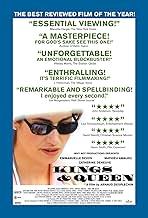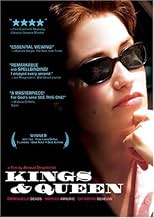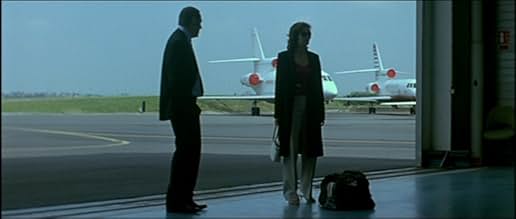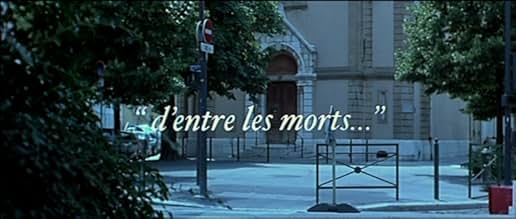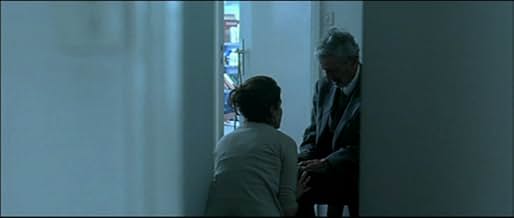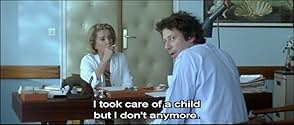AVALIAÇÃO DA IMDb
7,0/10
4,1 mil
SUA AVALIAÇÃO
Histórias paralelas contam a situação atual de dois ex-amantes: Nora é uma mãe solteira que cuida de seu pai em estado terminal; enfiado em uma enfermaria psiquiátrica, Ismael, um músico bri... Ler tudoHistórias paralelas contam a situação atual de dois ex-amantes: Nora é uma mãe solteira que cuida de seu pai em estado terminal; enfiado em uma enfermaria psiquiátrica, Ismael, um músico brilhante, planeja sua fuga.Histórias paralelas contam a situação atual de dois ex-amantes: Nora é uma mãe solteira que cuida de seu pai em estado terminal; enfiado em uma enfermaria psiquiátrica, Ismael, um músico brilhante, planeja sua fuga.
- Direção
- Roteiristas
- Artistas
- Prêmios
- 9 vitórias e 18 indicações no total
- Direção
- Roteiristas
- Elenco e equipe completos
- Produção, bilheteria e muito mais no IMDbPro
Avaliações em destaque
Armand Deplechin's "Rois et Reine" offers a lot of different ideas, plots and subplots. Unfortunately, most of them aren't as fully realized as in his other, better made films. Then, the copy that is showing at New York's Lincoln Plaza complex, has a washed out look to it, and the subtitles aren't visible at times. The viewer has to strain the eyes in order to get all what's going on in this complex tale. This is a big problem for foreign films with subtitles that seem to fade in the picture itself. Also, at the session we went there was an annoying group of ladies who, evidently, must have been watching another film, as they kept laughing at times when they should have remained silent.
At any rate, this is a complex film that seems to have a lot of influences, mainly mythological and even it has shades of Shakespeare's King Lear. At two hours and forty minutes in length, the film could have used some badly needed trimming. It appears M. Desplechin don't know when to cut some of the things one sees in different sequences that could have been helped with the principle that "less is more".
One thing the director can't be blamed for is the wonderful performances he gets from all his actors, especially, the luminous Emmanuelle Devos, who does an amazing work portraying Nora, the woman at the center of the story. Also good, Mathieu Amalric, who is Ismael, the man that connects a lot of different points to the story. Maurice Garrel, as Nora's dying father is compelling. Valentin Legong as little Elias is also a great asset.
Let's hope M. Desplechin new venture will be a bit tighter in his future work.
At any rate, this is a complex film that seems to have a lot of influences, mainly mythological and even it has shades of Shakespeare's King Lear. At two hours and forty minutes in length, the film could have used some badly needed trimming. It appears M. Desplechin don't know when to cut some of the things one sees in different sequences that could have been helped with the principle that "less is more".
One thing the director can't be blamed for is the wonderful performances he gets from all his actors, especially, the luminous Emmanuelle Devos, who does an amazing work portraying Nora, the woman at the center of the story. Also good, Mathieu Amalric, who is Ismael, the man that connects a lot of different points to the story. Maurice Garrel, as Nora's dying father is compelling. Valentin Legong as little Elias is also a great asset.
Let's hope M. Desplechin new venture will be a bit tighter in his future work.
Rois et Reine starts and ends with an audio feast of divinely beautiful unplugged "Moon River". In between, it offers the richest content that I remember in any film that I've seen.
Use of two parallel, initially apparently unrelated story lines is a favourite structure for movie makers. One that immediately comes to mind is Le Huitieme Jour. In Rois et Reine, one thread is Nora, a beautiful art gallery director struggling with a terminally ill father and a fatherless son Elias. The other thread is Ismael, a viola player taken into a psychiatric ward through strange circumstances. However, it does not take long (relative to the two-and-a-half-hour film) to get to the convergence point where the audience are privy to the fact that Nora and Ismael had lived together for seven years during which Nora's son developed a devoting affection for and attachment to Ismael (which, incidentally, reminds me of a similar relationship in Love Actually, in a character played by Liam Neeson).
But this is only the bare beginning. The sprawling story surrounding these two main characters commands the viewers' every attention, and this film really deserves several viewing.
I wouldn't attempt to go into all the details of the many characters, sub-plots and sub-texts. Briefly, the central story is Nora's relationships with three men, Elias's father who was shot under suspicious circumstances, Ismael who became Elias's de facto father and the man she is now going to marry but is not really certain if she truly loves or not. While those relationships are touched on lightly, some through flashbacks, her relationship with her father Louis and sister Chloe receive sharper focus, with twists and turns leading to some rather devastating revelations towards the end.
With Ismael's family (and there are quite a few members) the circumstances are very different, but equally intriguing. While there is also conflict, and this one centres around the issue of adoption and estate, the mood in one of wry humour. Family matters aside, there is also another dimension, the psychiatric ward, where Ismael interacts with no less than three psychiatrists (one played by Catherine Deneuve) as well as a women fellow-patient Arielle with whom he develops a close relationship that continues after their discharge.
And don't be mislead into thinking that quantity will compromise quality. The entire film is throbbing with energy, telling the story in so many different ways, in so many changing moods, which, however, never feels disjointed. Similarly, the deft use of background music brings you delight in every turn.
I have only touched on the bare surface of this absorbing film. Among the many fascinating aspects of the film is the development of the two main characters and a common characteristic: both are vain and arrogant. Yet, the interesting thing is that they are not portrayed in that light at all. It's through the description by other characters that this comes to light, and then we are compelled to look behind the surface to understand.
The audience will find that there are many scenes, from devastatingly emotional to hilariously noire, that they will remember long afterwards. If I were to pick a most memorable one, however, it will be the last scene, between Ismael and Elias, and I think many who have seen the film will agree. A masterful piece of auteurist work, Rois et Reine is a film that will be a crime to miss.
Use of two parallel, initially apparently unrelated story lines is a favourite structure for movie makers. One that immediately comes to mind is Le Huitieme Jour. In Rois et Reine, one thread is Nora, a beautiful art gallery director struggling with a terminally ill father and a fatherless son Elias. The other thread is Ismael, a viola player taken into a psychiatric ward through strange circumstances. However, it does not take long (relative to the two-and-a-half-hour film) to get to the convergence point where the audience are privy to the fact that Nora and Ismael had lived together for seven years during which Nora's son developed a devoting affection for and attachment to Ismael (which, incidentally, reminds me of a similar relationship in Love Actually, in a character played by Liam Neeson).
But this is only the bare beginning. The sprawling story surrounding these two main characters commands the viewers' every attention, and this film really deserves several viewing.
I wouldn't attempt to go into all the details of the many characters, sub-plots and sub-texts. Briefly, the central story is Nora's relationships with three men, Elias's father who was shot under suspicious circumstances, Ismael who became Elias's de facto father and the man she is now going to marry but is not really certain if she truly loves or not. While those relationships are touched on lightly, some through flashbacks, her relationship with her father Louis and sister Chloe receive sharper focus, with twists and turns leading to some rather devastating revelations towards the end.
With Ismael's family (and there are quite a few members) the circumstances are very different, but equally intriguing. While there is also conflict, and this one centres around the issue of adoption and estate, the mood in one of wry humour. Family matters aside, there is also another dimension, the psychiatric ward, where Ismael interacts with no less than three psychiatrists (one played by Catherine Deneuve) as well as a women fellow-patient Arielle with whom he develops a close relationship that continues after their discharge.
And don't be mislead into thinking that quantity will compromise quality. The entire film is throbbing with energy, telling the story in so many different ways, in so many changing moods, which, however, never feels disjointed. Similarly, the deft use of background music brings you delight in every turn.
I have only touched on the bare surface of this absorbing film. Among the many fascinating aspects of the film is the development of the two main characters and a common characteristic: both are vain and arrogant. Yet, the interesting thing is that they are not portrayed in that light at all. It's through the description by other characters that this comes to light, and then we are compelled to look behind the surface to understand.
The audience will find that there are many scenes, from devastatingly emotional to hilariously noire, that they will remember long afterwards. If I were to pick a most memorable one, however, it will be the last scene, between Ismael and Elias, and I think many who have seen the film will agree. A masterful piece of auteurist work, Rois et Reine is a film that will be a crime to miss.
"Rois et reine" aka "Kings and Queen" (2004) directed by Arnaud Desplechin is a most unusual film that mixes expertly comical and tragic, unbearable and optimistic, life and death that are intertwined in the story of two former lovers whose lives have crossed once more when they least expected. Nora (Devos) has to take care of her dying father. Ismael (Almaric), a talented but neurotic musician (Roman Polansky + Woody Allen) is mistakenly committed to a mental hospital under the care of a clinical psychiatrist, forever young and still the most beautiful woman in the world, Catherine Denueve. ("Do you know that you are very beautiful"? - asked Ismael. "I've been told", smiles she). I still think about the movie - the complicated relationships between one woman and several men in her life - how much she affected them, sometimes, with tragic consequences. This is also the movie about perception - how big is the difference between the way we see ourselves and the others see us and what they think of us in reality. It is a movie about love - is it always blind? Is it possible to love deeply and see with the clear eyes? I was totally engrossed and heartbroken by some scenes involving Devos's caring for her dying father, by the flashbacks that tell about her relationship with the father of her son, and next minute I was laughing out loud following the Almaric's ordeal in a mental hospital and his attempts to escape. The movie could've been a gem but it is too long, has too many characters that were perhaps very interesting but I never knew what happened to them and it could be confusing due to its broken narrative which was OK by me but the final result even compelling and memorable was not completely satisfying. Both Mathieu Almaric and Manu Devos are marvelously talented actors and they were the main reason that overlong and confusing movie worked. I hope to see both Almaric and Devos in many more movies. I remember Devos since the first movie I saw her in - "Sur Mes Levres" and I knew then that she had all potentials to become a great actress. Her acting in "Rois et reine" confirmed my first impression.
I was so hoping it would live up to the hype...and it almost does - but you know how it goes with extravagantly praised films.
Desplechin's 1996 "My Sex Life" was brilliant - a rambling, shambling, thoroughly engaging 3 hour trip through the lives of a group of rambling, shambling, lost characters, made by a director looking to pour as much raw life into a film as possible and let the rest sort itself out. He has no interest in a well-knit story....
This somehow doesn't work as well here...what is missing is the "engaging" part. This isn't a matter of his being unable edit himself; it's just characters and their situations just seem less able to cross the divide and touch you.
But i'm all in favor of Desplechin's intentions. This is a director definitely worthy of trust and respect. And can all those critics be wrong? I'm going to see this again.
"My Sex Life" had the benefit of three wonderful actors: Mathieu Almaric, Jeanne Ballibar and Emmanuelle Devos...we need more films from all three. Almaric and Devos return here. He is, as always, terrifically fun to watch. But this is her movie...Emmanuelle Devos seems to be coming into her own now, after years of playing lesser roles (The Beat my Heart Skipped). She is a marvel. Always playing the victim, stoic and long-suffering, and always bringing to this role a huge richness of feeling. She is heart-wrenching here, as she was in "My Sex Life", which she practically stole. And what a remarkable look she has...one moment the ugly duckling, another moment a ravishing beauty. I can't take my eyes off her. A great actress.
Desplechin's 1996 "My Sex Life" was brilliant - a rambling, shambling, thoroughly engaging 3 hour trip through the lives of a group of rambling, shambling, lost characters, made by a director looking to pour as much raw life into a film as possible and let the rest sort itself out. He has no interest in a well-knit story....
This somehow doesn't work as well here...what is missing is the "engaging" part. This isn't a matter of his being unable edit himself; it's just characters and their situations just seem less able to cross the divide and touch you.
But i'm all in favor of Desplechin's intentions. This is a director definitely worthy of trust and respect. And can all those critics be wrong? I'm going to see this again.
"My Sex Life" had the benefit of three wonderful actors: Mathieu Almaric, Jeanne Ballibar and Emmanuelle Devos...we need more films from all three. Almaric and Devos return here. He is, as always, terrifically fun to watch. But this is her movie...Emmanuelle Devos seems to be coming into her own now, after years of playing lesser roles (The Beat my Heart Skipped). She is a marvel. Always playing the victim, stoic and long-suffering, and always bringing to this role a huge richness of feeling. She is heart-wrenching here, as she was in "My Sex Life", which she practically stole. And what a remarkable look she has...one moment the ugly duckling, another moment a ravishing beauty. I can't take my eyes off her. A great actress.
"Kings and Queen (Rois et reine)" is a deceptively beautiful looking exploration of the differences between appearances and substance.
Our first impressions of each parallel character who seems to have no relation with any other character undergo a complete turn-around by the time we have finished circling around them in time and space at the end of the film, especially as we begin to realize they are unreliable, self-serving narrators of their own experiences.
Each person is part of a very modern blended family, both by genetics and selection, and faces the most quotidian of life cycle decisions -- life, birth, marriage, paying bills, parent/child responsibilities, Laingian sanity and particularly death -- and makes a different choice how to handle them, whether active or passive, peremptorily or as fate.
But each choice leads them to the next unexpected plateau of choices with guilt hanging on each move. For each, doing the right thing means something completely different as each responds differently to an emotional and physical crisis.
Though psychoanalysis is drolly mocked as just another philosophy, each character may be eccentric or seriously crazy and undergoes Freudian traumatizations by family in casually cruel ways that alternate between funny and shocking (and sometimes absurd).
Director/co-writer Arnaud Desplechin revels in the diversity of his characters, so that as their orbits collide they can hardly communicate because their frames of reference are so different.
The acting brilliantly matches the unexpected revelations that flash back to let us know how each character got to be this person and the transformations to where they are going. Emmanuelle Devos as "Nora" lusciously fills the screen even as we find that her nonchalant beauty masks the devastation she leaves in her wake as it helps her use others for her selfish needs.
Desplechin has frequently cited Woody Allen as an influence (and "Seinfeld"), and Mathieu Amalric's Ismaël is a tribute to that talkative, intellectual Jewish persona and Philip Roth is mentioned as well, though this character is much more up on hip pop music and surprisingly matures as he gains far more humanity than his New York inspirations.
The film is long and slow, but curiosity about how each character got to where the film started is involving.
It's impossible to keep up with all the erudite references to poetry (Desplechin says the title comes from a chess metaphor in a French poem: "King without kingdom/ Queen without a scene/ Castle broken/ Bishop betrayed/ Fool as a brave man"), literature, mythology, art, music and film ("Moon River" seems to be used frequently these days).
Eric Gautier's cinematography is sensual and is particularly dreamy when an awful event occurs.
The production design creates illustrative environments for each person and family, as every object around each character has ironic counterpoint to the dialog.
The soundtrack eclectically extends from electronica to klezmer to hip hop to singer/songwriters Paul Weller and Randy Newman to classical and more that reflect the characters' psychological mise en scenes.
Our first impressions of each parallel character who seems to have no relation with any other character undergo a complete turn-around by the time we have finished circling around them in time and space at the end of the film, especially as we begin to realize they are unreliable, self-serving narrators of their own experiences.
Each person is part of a very modern blended family, both by genetics and selection, and faces the most quotidian of life cycle decisions -- life, birth, marriage, paying bills, parent/child responsibilities, Laingian sanity and particularly death -- and makes a different choice how to handle them, whether active or passive, peremptorily or as fate.
But each choice leads them to the next unexpected plateau of choices with guilt hanging on each move. For each, doing the right thing means something completely different as each responds differently to an emotional and physical crisis.
Though psychoanalysis is drolly mocked as just another philosophy, each character may be eccentric or seriously crazy and undergoes Freudian traumatizations by family in casually cruel ways that alternate between funny and shocking (and sometimes absurd).
Director/co-writer Arnaud Desplechin revels in the diversity of his characters, so that as their orbits collide they can hardly communicate because their frames of reference are so different.
The acting brilliantly matches the unexpected revelations that flash back to let us know how each character got to be this person and the transformations to where they are going. Emmanuelle Devos as "Nora" lusciously fills the screen even as we find that her nonchalant beauty masks the devastation she leaves in her wake as it helps her use others for her selfish needs.
Desplechin has frequently cited Woody Allen as an influence (and "Seinfeld"), and Mathieu Amalric's Ismaël is a tribute to that talkative, intellectual Jewish persona and Philip Roth is mentioned as well, though this character is much more up on hip pop music and surprisingly matures as he gains far more humanity than his New York inspirations.
The film is long and slow, but curiosity about how each character got to where the film started is involving.
It's impossible to keep up with all the erudite references to poetry (Desplechin says the title comes from a chess metaphor in a French poem: "King without kingdom/ Queen without a scene/ Castle broken/ Bishop betrayed/ Fool as a brave man"), literature, mythology, art, music and film ("Moon River" seems to be used frequently these days).
Eric Gautier's cinematography is sensual and is particularly dreamy when an awful event occurs.
The production design creates illustrative environments for each person and family, as every object around each character has ironic counterpoint to the dialog.
The soundtrack eclectically extends from electronica to klezmer to hip hop to singer/songwriters Paul Weller and Randy Newman to classical and more that reflect the characters' psychological mise en scenes.
Você sabia?
- CuriosidadesThe title of the movie was inspired to Arnaud Desplechin by the five first lines of a poem by Michel Leiris: "Rois sans arrois Reine sans arène Tour trouée Fou à lier Cavalier seul"
- Citações
Nora Cotterelle: There are four men I loved. I killed two of them.
- ConexõesReferenced in Totalmente Apaixonados (2005)
- Trilhas sonorasPavane pour une Infante défunte
Composed by Maurice Ravel
Principais escolhas
Faça login para avaliar e ver a lista de recomendações personalizadas
- How long is Kings & Queen?Fornecido pela Alexa
Detalhes
Bilheteria
- Orçamento
- € 3.871.153 (estimativa)
- Faturamento bruto nos EUA e Canadá
- US$ 290.973
- Fim de semana de estreia nos EUA e Canadá
- US$ 16.101
- 15 de mai. de 2005
- Faturamento bruto mundial
- US$ 3.839.556
- Tempo de duração
- 2 h 30 min(150 min)
- Cor
- Mixagem de som
- Proporção
- 2.35 : 1
Contribua para esta página
Sugerir uma alteração ou adicionar conteúdo ausente

